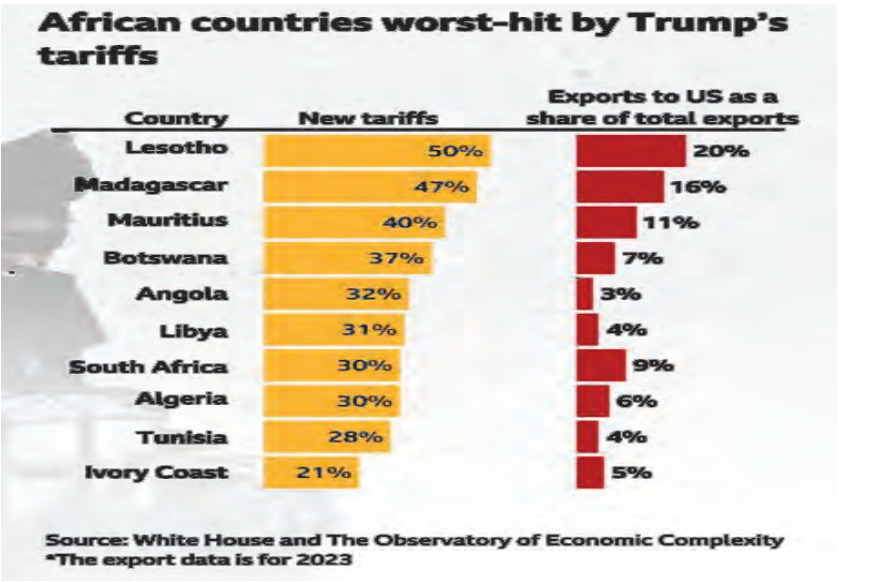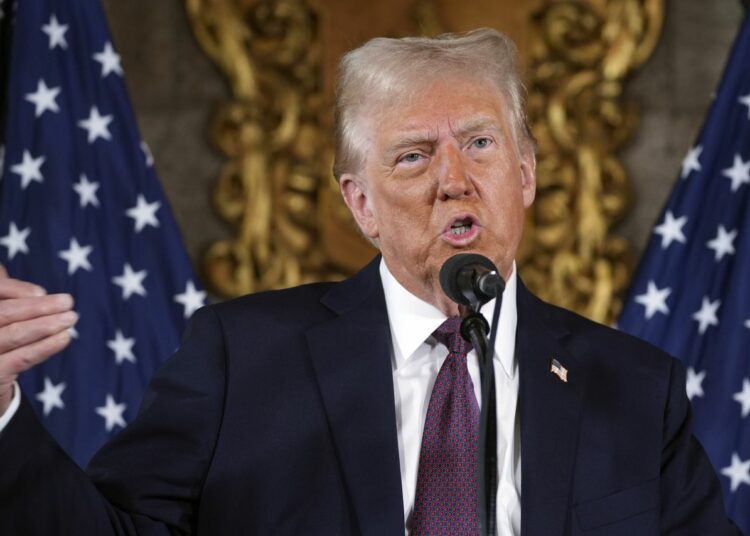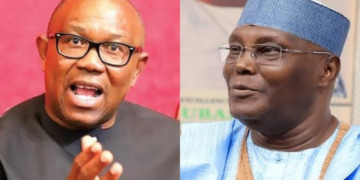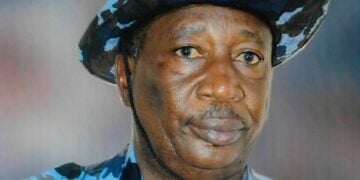As the retaliatory tariffs announced by United States (US) President Donald Trump continue to send shockwaves across the globe, economic and financial experts, an ex-envoy, and other industry stakeholders have charged the Nigerian government and other African leaders to embark on trade and economic integration to save the continent from the looming global recession.
They specifically advised the federal government to look inward and channel more resources into agriculture to tap into the huge 1.4 billion Chinese market to avert job losses and worsen the current abject poverty among Nigerians.
Those who spoke with LEADERSHIP Sunday on the new tariff regime declared by Trump last Wednesday include the director of Abuja-based Centre for China Studies, a think tank for policy formulation and implementation, Charles Onunaiju; a former Nigerian High Commissioner to Singapore, Ambassador Ogbole Ode; a senior lecturer with the Department of Political Science, Nnamdi Azikiwe University, Awka, Anambra State, Dr. Christian Okeke, and the national president of Association of Small Business Owners of Nigeria (ASBON), Dr. Femi Egbesola.
Others are the director/CEO of the Centre for the Promotion of Private Enterprises (CPPE), Dr Muda Yusuf; chief operating officer of InvestData Consulting Limited, Mr Ambrose Omorodion; an investment analyst and an entrepreneur, Mr Adebayo Adeleke; Dr. Tunde Adesina of Lagos Business School; an economist and business strategist, Marcel Okeke; business strategist Ifeanyi Okonkwo; trade policy analyst Omotola Ajayi, and Ade Atobatele, founder of Remarkable Ideas Ltd.

The torrent of tariffs is already causing ripples as companies have started recording losses, including US companies whose stocks have tumbled. This poses the imminent threat of a global trade war that could trigger a recession.
Trump imposed a 10% baseline tariff on all imports to the US and higher duties on dozens of other countries on what he called America’s “Liberation Day,” on Wednesday.
Under it, a 24% tariff was imposed on Japan, South Korea 25%, Taiwan 32%, and the European Union 20%. The UK, Australia, New Zealand, Saudi Arabia and most of South America were let off with the minimum 10%.
Trump announced that China would be hit with a 34% tariff on top of the 20% he had previously imposed earlier this year. This brings the total new levies to 54% and was close to the 60% figure he had threatened while on the campaign trail. Beijing has since retaliated with a 34% tariff on US goods in China.
African countries were hit with varying degrees of tariffs, with Lesotho leading with 50%, Madagascar with 47%, South Africa with 30%, and Nigeria with 14%. Several other African countries were not spared the 10% baseline tariff.
Action May Trigger Global Trade Contraction, Okonjo-Iweala Warns
The director-general of the World Trade Organisation (WTO), Dr. Ngozi Okonjo-Iweala, has warned of a looming contraction in global merchandise trade following U.S. President Donald Trump’s sweeping tariffs.
The WTO chief, on Friday, warned that the rapidly escalating situation could push the world deeper into economic uncertainty and fuel a full-blown trade war.
“The recent announcements will have substantial implications for global trade and economic growth prospects,” Iweala said.
“Our initial estimates suggest that these measures, coupled with those introduced since the beginning of the year, could lead to an overall contraction of around one per cent in global merchandise trade volumes this year, representing a downward revision of nearly four percentage points from previous projections.”
Despite the downturn, she stressed that most global trade still operates under WTO rules.
“The vast majority of global trade still flows under the WTO’s Most-Favoured-Nation (MFN) terms. Our estimates now indicate that this share currently stands at 74%, down from around 80% at the beginning of the year.”
The WTO chief urged member states to act responsibly and avoid an uncontrolled spiral of retaliatory measures. “Trade measures of this magnitude have the potential to create significant trade diversion effects. I call on members to manage the resulting pressures responsibly to prevent trade tensions from proliferating.”
Okonjo-Iweala reaffirmed the WTO’s role as a mediator in times of rising tensions, urging member countries to use the organisation’s platform to engage constructively.
“The WTO was established to serve precisely in moments like this, as a platform for dialogue, to prevent trade conflicts from escalating,” she said.
In a chat with LEADERSHIP Sunday, Charles Onunaiju averred that while global disruption is a huge challenge to Nigeria and other African countries, it is also an enormous opportunity for the continent to link up with the emerging markets in Asia-Pacific, including trading more within Africa.
He noted that although the US’s reasons for the slew of tariffs to lure back factories to the US might sound reasonable on some grounds, they are far from current reality, as they raise questions over the global competitiveness of such products.
He added that Nigeria’s trade with the US under the Africa Growth Opportunity Act (AGOA), which comes to an end in September this year, has been marginal.
He said, “It is an opportunity to diversify our trade partnership and trade more within Africa to improve the intra-African trade volume from the meagre 4%. This could be a boom, but the leaders must understand this.
“We can consolidate our markets in Africa within the framework of the African Continental Free Trade Agreement (ACFTA) to grow and develop our economies. Africa can harmonise industrial policy and tariff and avoid product repetition.”
He called on Nigerian and African leaders to explore the 1.4 billion Chinese market, which has an 800 million-strong middle class, and offered Nigeria the opportunity to bring its agricultural products, which are not fully utilised.
“Chinese markets are beckoning on Nigerian products, but we have an extensively dysfunctional Nigerian system that is militating against progress,” he said.
For his part, Ode said it was disturbing that the US, which is an “apostle of globalisation,” is back-peddling on the global rule-based economy, which it helped to establish. He pointed out that imposing tariffs on the global economy will upset global trade and could lead to recession.
“The tariff regime might just be to lure back American companies that have outsourced production facilities to other countries in order to compel them to return to the US with the production facilities, but the labour cost might be an albatross to the US, and I see the US economy suffering a tailspin which will lead to global recession,” he said.
“Nigeria is economically down, but this situation presents an excellent opportunity to delink from the US and explore other areas to grow and develop our economy, especially in the agriculture and industry sectors.”
He urged the country’s leaders to look inward and devise a functional strategy.
Dr Okeke also noted that the Trump administration’s new 14 per cent tariff on Nigeria’s exports is intended to protect local jobs and manufacturing in his country, adding that he aims to supercharge America’s industrial base.
Okeke, who specialises in International Relations, said that without engaging in debates over the claim that Nigeria imposed a 27% tariff on US exports, the action should help Nigeria and her leaders to look inward and, for once, love the country.
“It is not a time to be despondent; after all, five African countries were imposed higher tariffs than Nigeria. Let the political elite in Nigeria show patriotism and determination by encouraging local manufacturing and patronising made-in-Nigeria products,” he advised.
He lamented that Nigeria’s industrial capability remains at a low ebb, with the economic environment too scorching for businesses to thrive.
He added that investments in science and technology, research and innovation, and human capital development are nothing to write home about.
“Thousands of jobs and industries keep leaving as a result of unfavourable economic policies, inconstant electricity supply, low wages, lack of support, poor institutional support and corruption,” he stated.
The renowned scholar advised the federal government to revisit the subsidy removal policy imposed on Nigerians without sustainable cushioning effects.
He also advised against high taxation, double taxation, high cost of governance, and over-reliance on politics for survival, adding that weak institutions and avaricious greed have crippled the geo-economic space.
“High energy cost needs to be revisited at this time if Nigeria truly desires to develop. In the face of the abundance of natural and human resources, factors that encourage brain drain should be reevaluated and addressed.
“Most importantly, there must be a stiff penalty for socio-political and economic sabotage being perpetrated by some politicians if the soul of the state must be saved.
“It took evil and corrupt politicians to push Nigeria to the precipice. Likewise, a national rebirth will take it out of it and the time is now. The problem is whether the politicians are willing and determined,” he said.
There are strong indications the US tariffs may pose additional economic shocks in Nigeria, especially to small and medium enterprises (SMEs) and other exporting business lines.
Analysts who spoke to LEADERSHIP Sunday also warned that the added tariff could force Nigeria to diversify its trade partnerships further, strengthening ties with other regions such as the European Union, the United Kingdom, and Asia.
For his part, Egbesola stated that Trump’s reciprocal tariffs would further haunt small and medium enterprises (SMEs) and export businesses, creating several bottlenecks in trade.
He said America’s decision to implement a strong and aggressive tariff policy is expected to limit exports to the USA, adding that the policy is anti-progress, which could signal more complications to trade.
He advised SMEs and manufacturers in Nigeria to look inward for alternative markets beyond America with friendly tariffs while advising the Africa Continental Free Trade Agreement (AfCFTA) to key into this new policy to make the African market the most significant trade destination since Africa has the population.
He said AfCFTA should gear up efforts to assist African SMEs, entrepreneurs, and manufacturers in keying into Africa’s markets, which have over one billion people.
He argued that the new tariff regime could further strain trade relations between both nations, as Nigerian exporters will now face higher costs when accessing the US market.
The director/CEO of the Centre for the Promotion of Private Enterprises (CPPE), Dr Muda Yusuf, stated that “Nigeria’s external trade exposure to the United States is averagely about 10%.
“In 2024, Nigeria’s total merchandise exports were valued at $50.4 billion, and Nigeria’s exports to the United States that same year were $5.7 billion, which was 11.3%.
“Nigeria’s major exports to the US are crude oil, petroleum gas, and nitrogenous fertiliser, while major US exports to Nigeria are mainly vehicles, wheat, and fuels. Other major export destinations for Nigerian products are Spain, France, Netherlands, and Italy. Oil and gas products account for nearly 90 per cent of Nigeria’s exports. This has been the position for about three decades.”
Yusuf added that “there is very little to negotiate about because when we compare the tariff imposed on Nigeria to the tariff imposed on other countries, even in Africa, Nigeria has one of the lowest in terms of this Trump tariff imposition.”
He also noted that “in terms of our direct exposure in terms of export trade, export destination, our export exposure to the United States is just about 10 per cent or less. So we are not strategically dependent on the United States for most of our exports. Even as we speak, Europe is our major trading partner.”
Earlier, the chief operating officer of InvestData Consulting Limited, Mr. Ambrose Omordion, said stakeholders are increasingly concerned about the potential economic impact of a global trade war, particularly with the US imposing new tariffs on imports from countries like China, Canada, Mexico, and Africa.
He urged Nigeria to diversify its economy to reduce its reliance on oil exports and mitigate the effects of the trade war.
“To stay ahead, Nigerian businesses and policymakers must closely monitor the situation and develop strategies to address potential challenges. This may involve exploring new trade partnerships, diversifying the economy, and implementing policies to support businesses affected by the trade war,” he said.
Speaking exclusively to LEADERSHIP Sunday, an investment analyst and entrepreneur, Mr. Adebayo Adeleke, said the tariffs are harsher on American consumers.
Adebayo, the group managing director/CEO of Lancelot Ventures Ltd, noted that “the whole essence of the Tariff is to make our products unattractive and non-competitive. However, it could be unattractive and non-competitive if there are local substitutes for such products in America. So, the whole essence of what Trump is doing is to protect the indigenous economy in America. For as long as what we are exporting to America has no local substitute in America, the tariff doesn’t make sense. The tariffs are going to punish Americans because they will be forced to pay more. “
US Tariffs Will Undermine Nigeria’s Food, Textile Exports
According to data from Nigeria’s National Bureau of Statistics (NBS), the country’s trade with the U.S. between 2015 and 2024 totalled N31.1 trillion. Of that, exports to the U.S. accounted for N16.4 trillion, or about 8.7% of Nigeria’s total global exports. Much of that trade includes key non-oil products such as cocoa, textiles, and processed food, sectors now facing heightened uncertainty.
Nigeria’s textile industry, once a major employer and economic driver, has struggled in recent decades due to power shortages, inconsistent policies, and rising costs. For some manufacturers who managed to access niche U.S. markets through initiatives like the African Growth and Opportunity Act (AGOA), the tariff shift could erase hard-won progress. With AGOA set to expire in September 2025 and its renewal now uncertain, the window of opportunity may be closing.
“If AGOA is renegotiated or its benefits reduced, it could impact trade in Nigeria, as the U.S. remains one of the country’s top five export destinations for oil and agricultural products,” the Nigerian Economic Summit Group (NESG) noted in its recent report.
Food exports face similar challenges. Nigeria’s processed agricultural goods, such as shea butter, sesame oil, and spices, depend on slim margins and low trade barriers to remain competitive. Increased U.S. tariffs could deter importers already grappling with inflation and tight logistics networks.
“U.S.-based multinational corporations facing higher import costs may rethink sourcing from African suppliers,” warned Dr. Tunde Adesina of Lagos Business School. “This could shift trade routes away from Nigeria toward nations with better trade agreements or lower political risk.”
The broader economic backdrop paints an even more concerning picture. Foreign direct investment (FDI) into Nigeria has been in free fall, dropping from $3.31 billion in 2021 to just $1.87 billion in 2023. Analysts fear that Trump’s tariff blitz will deepen this trend, further dissuading foreign capital.
“Trump’s tax reforms may encourage U.S. firms to repatriate investments, reducing FDI in Nigeria,” the NESG report warned. “To counter this, Nigeria should attract investors from China, the EU, and Gulf nations by improving its investment climate.”
Reduced FDI and declining exports could significantly impair Nigeria’s industrialisation agenda. Many firms in manufacturing and agro-processing rely on access to global markets, especially large ones like the U.S., to scale operations, generate employment, and reinvest profits.
“In a worst-case scenario, if global supply chains are disrupted due to Trump’s tariff policies, we could see capital flight from Nigeria, further exacerbating the country’s economic challenges,” said trade policy analyst Omotola Ajayi.
An economist and business strategist, Marcel Okeke, emphasised that global oil price volatility, exacerbated by U.S. self-sufficiency in fossil fuels, further complicates matters.
“If the U.S. increases its domestic fossil fuel production, certainly the price of oil will come down, and the price coming down has a lot of implications,” Okeke said, noting that declining oil revenue puts even more pressure on Nigeria to grow non-oil exports.
Business strategist Ifeanyi Okonkwo called for a pivot in Nigeria’s trade diplomacy: “Nigeria should look beyond the U.S. and leverage AfCFTA to boost intra-African trade and attract investors who see the continent as a growing consumer and production hub,” he stated.
The road ahead is undoubtedly challenging. But Nigeria still has options. Strengthening trade ties with Europe, Asia, and fellow African nations, investing in local processing capacity, and enhancing trade infrastructure are all necessary steps.
“The key to attracting and retaining FDI is creating a stable and transparent business climate,” Dr. Adesina emphasised. “That means reducing bureaucracy, ensuring policy consistency, and investing in power and transport infrastructure.”
But the chief executive of the Centre for the Promotion of Private Enterprise, Dr. Muda Yusuf, was optimistic that Nigeria will naturally find other markets to export her products, citing that although the US market is a significant one, it’s not the only market. He also stressed that new trading blocs can be created and strengthened for new and diverse trade.
For Nigeria’s food and textile exporters, Trump’s new tariffs may feel like a door slamming shut. But with the right policies and partners, other doors can open. The clock is ticking—and the future of Nigerian trade may depend on how quickly and effectively the country can adapt.
Trump Urges US Businesses Public To ‘Hang Tough’
Meanwhile, Trump has insisted he will deliver “historic” results with his tariff plan but appealed to businesses and the American public to “hang tough”.
Trump’s message to “hang tough” is a nod to stock market turmoil
Wall Street’s three main indexes have dropped by more than 5%.
“Hang tough. It won’t be easy, but the end result will be historic,” Trump said in his post yesterday.
France, India, UK Opt For Negotiation As Businesses Review Operations
British Prime Minister Keir Starmer and French President Emmanuel Macron have indicated an interest in discussing the tariffs imposed by the White House.
A Downing Street readout of the call between the leaders says they “agreed that a trade war was in nobody’s interests but nothing should be off the table”.
The statement adds that they “shared their concerns about the global economic and security impact, particularly in South East Asia”.
They also discussed the talks the UK and France are chairing to bring together a “coalition of the willing” – the group of nations considering how to support Ukraine if any peace deal is signed.
Starmer is expected to spend this weekend speaking to foreign leaders about Trump’s tariffs, with Downing Street confirming he already spoke with his Australian and Italian counterparts on Friday.
Japan’s Prime Minister, Shigeru Ishiba, says he plans to call President Donald Trump after the White House announced a 24% tariff on Japanese imports to the US.
Speaking on Yomiuri TV, Ishiba suggested that Japan would not hit back with retaliatory measures.
Some countries, like India and the UK, hope to negotiate a trade deal with the US to spare them from Trump’s tariffs. Others, like China, have hit back with retaliatory action.
In the business sector, luxury car maker Jaguar Land Rover (JLR) has confirmed it’ll pause shipments to the US after the White House introduced a 25% tariff on all car imports.
Meanwhile, US and UK businesses have expressed concerns about the impact of Trump’s sweeping tariffs after 10% levies kicked in on imports from some countries
The president of the National Black Farmers Association told the BBC the tariffs are affecting the sector “directly”.
Big companies like Apple and Nike are already feeling the effects of the new measures as global markets experience turmoil. Wall Street’s three main indexes dropped by more than 5% yesterday.
Carmaker Stellantis has said it will temporarily shut down its assembly plant in Windsor, a Canadian city on the US border, next week due to the new tariffs
However, according to reports, Nissan is considering shifting some of its production to the US. It has also announced it’s reversing plans to scale back its operations in Tennessee
Protest In London
As anti-Trump protests kick off around the world, hundreds are gathering in London’s Trafalgar Square to demonstrate against the tariffs announced by the White House.
Alyssa, an American living in the UK, said the tariffs are causing “everyone to [lose] money”, and accused Trump and Elon Musk of “dismantling American democracy and trying to do the same thing in Europe”.
Alec Le Beut, who’s studying in the UK but comes from Los Angeles, said it’s more than just the tariffs, adding that the “administration’s actions towards its friends and allies have been scary.”
Meanwhile, there have been a number of anti-Trump demonstrations taking place across Europe and the US.
From Berlin to London, protesters have hit out against the US president and billionaire Trump adviser, Elon Musk, calling for an “end to the chaos” and expressing support for Ukraine.
Protesters held various signs in London’s Traflagar Square, one of which read, “No special relationship with Poundland Putin.”





